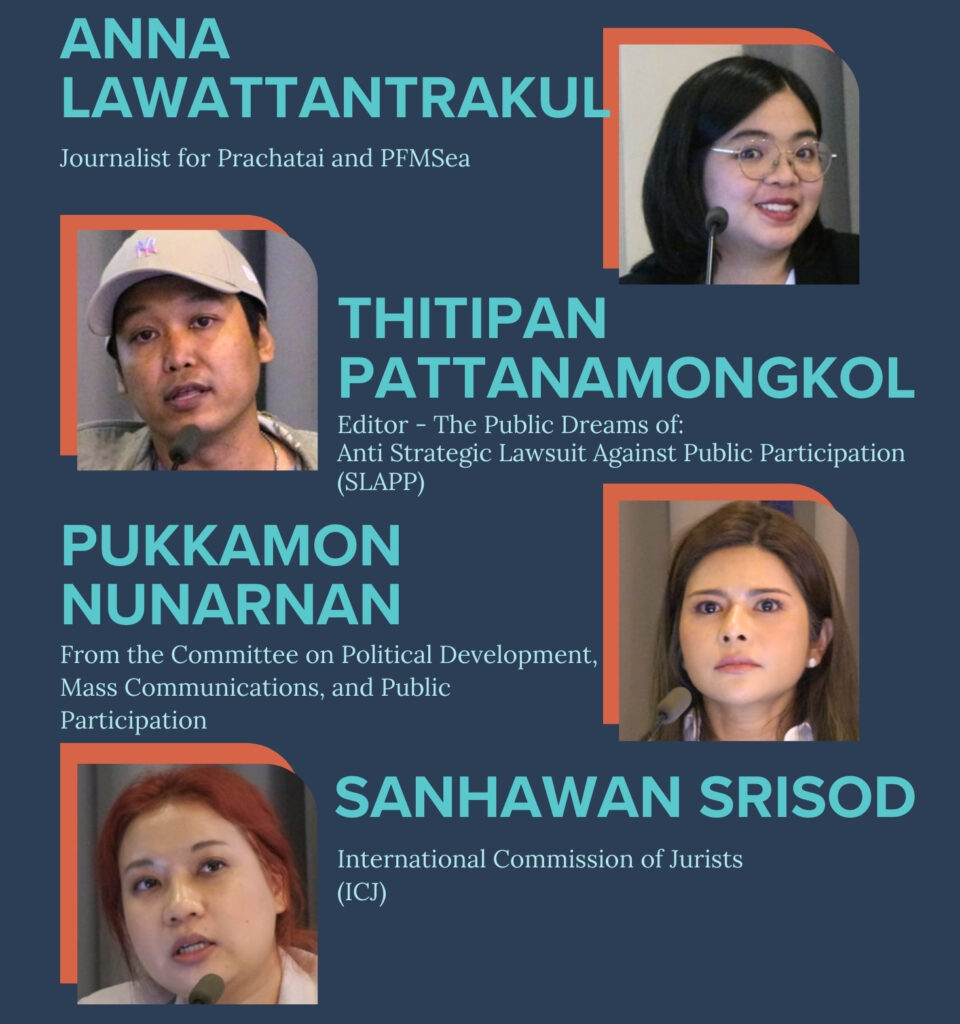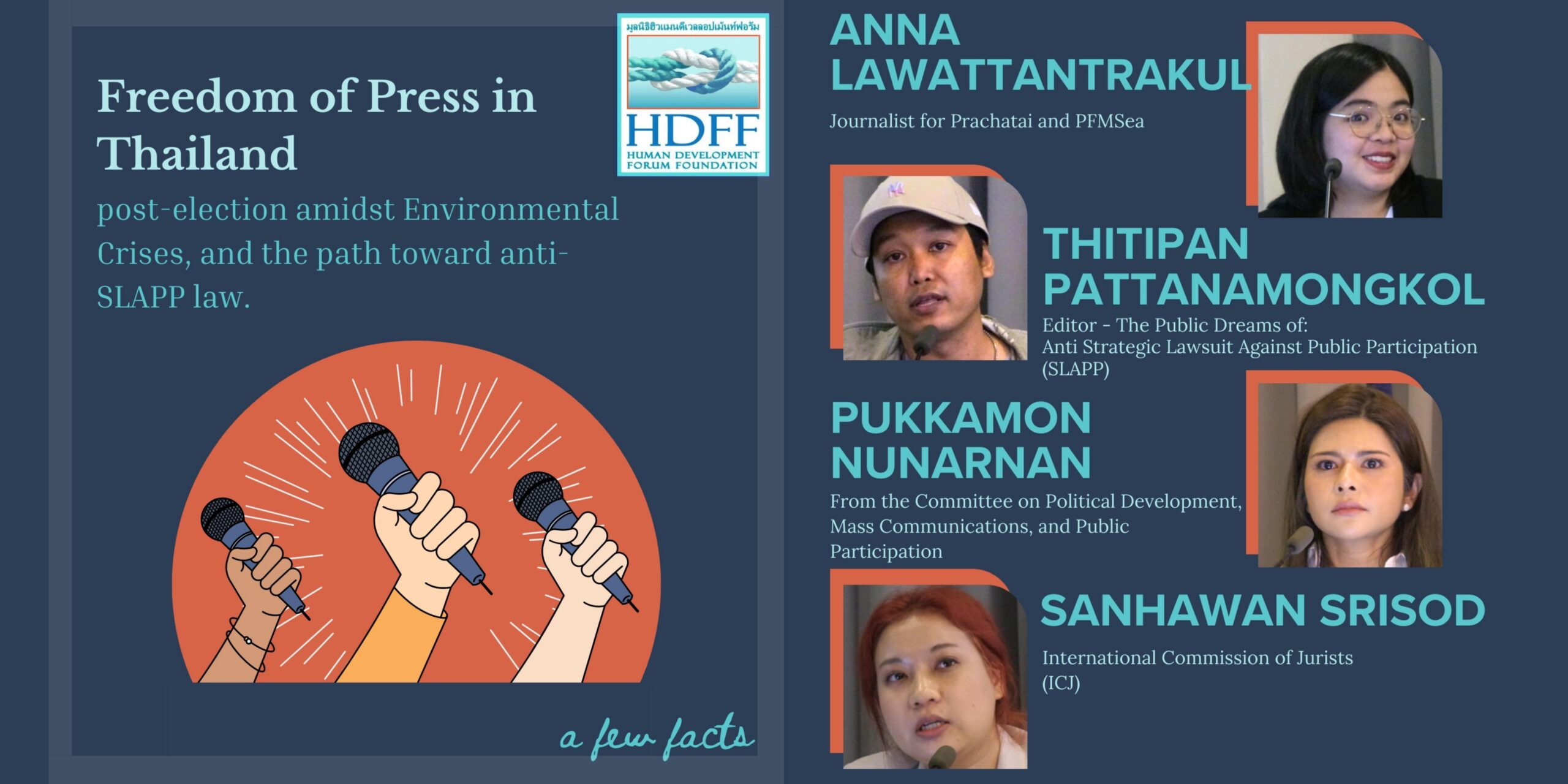By: Sofia Jefcoate*
To celebrate World Press Freedom Day on 3 May 2024, the HDFF team attended a panel conference on “Media freedom in Thailand post-election amidst environmental crisis, and the path towards anti-SLAPP Law” which links to the World Press Freedom Day theme of “A Press for the Planet: Journalism in the face of the Environmental Crisis”. The aim was to bring attention to the threat journalists face which undermines the International Human Right to freedom of expression. The event was co-organized by Prachatai (‘free people’), the United Nations Educational, Scientific and Cultural Organization (UNESCO) and Reporters Sans Frontieres (RSF)[1]. The event was hosted at the Foreign Correspondents’ Club of Thailand (FCCT).
Opening remarks were given by UNESCO and UNEP representatives and the keynote speech from Aleksandra Bielakowska, advocacy manager, Asia-Pacific Bureau, Reporters Sans Frontieres (RSF).

To address the question one needs to first understand the context. Then Royal Thai Army Chief General Prayut Chan-o-cha became Prime Minister of the country from 2014-2023, first after martial law was declared in 2014 and subsequently after elections in 2019 in which the Palang Pracharath Party (headed by Prayut) didn’t win enough seats but was elected PM. Yet, he was elected by the military-appointed senate. After the 2023 election a new PM, Mr. Srettha Thavisin of the Pheu Thai party took office. Therefore, media freedom has become an even greater topic of interest as a new party with fewer military connections took over. Thailand also faces the consequences of climate crises such as floods, droughts, pollution and extreme heat [2] which journalists are at the front line of reporting on. As a result, they are becoming the targets of Strategic Lawsuits Against Public Participation (SLAPPs) when covering controversial topics. This is supported by statistics that show that 34% of SLAPP filers are from the mining industry, with 53% of SLAPPs surrounding natural resources [3].
In the first round of questions, Thitipan Pattanmangku gave examples in which journalists were sued by companies with SLAPPs. He highlighted the difficulties inherent in the legal processes and related personal impacts when journalists are faced with SLAPPs giving an example of Wanchai Phutthathong who was sued for defamation. As a result, Phutthathong spent two years frequently commuting from Songkhla to Bangkok to the court to report for evidence which is a thirteen-hour drive. The case was eventually dismissed and the court said the content of the news matched reality. This demonstrates the power imbalance of SLAPPs because they pose a disproportionate threat to individual journalists due to the financial cost and time it takes to fight SLAPPS. This process can take over an individual journalist’s life whilst for big organisations it is only a small use of resources – this potentially intimidates journalists and can result in self-censorship.
Pukkamon Nunarnan continued the conversation talking about how there was still hope for Thailand, however, journalists need better protection and more support from organisations. Support from organisations is needed because she pointed out that almost all SLAPP suits are dismissed; however, it can take 5 to 6 years for the case to be dismissed by legal authorities. Most people do not have the time or resources to take care of a legal case for this long and therefore remove their published article. Sanhawan Srisod supported this point of view saying that the law surrounding SLAPPs is not up to international human rights standards and the judicial system needs to come up with better anti-SLAPP mechanisms. Pukkamon then talked about how the wording of the law is written broadly and has many loopholes. However, Lawattanatrakul pointed out in her round two answer that if the wording of the law is revised, this could pose a threat to journalists as some areas of journalism may be excluded such as reporting on social media.
Round two was a more in-depth discussion on the laws and legal system surrounding SLAPPs and the environment. Thitipan stated that there are so many SLAPP cases because environmental journalism is very young. As a result, there isn’t the expertise for legal defence and to have cases easily dismissed. He said this needs to change as journalists are increasingly reporting on environmental issues such as when the military-led government (NCPO) used Section 44 of the constitution to override civil planning laws in January 2016. These laws would have created legal limitations surrounding the construction of factories for energy production and waste management, at the cost of the environment. A similar example is the passing of an emergency bill in 2019 changing the definition of a factory resulting in fewer factories being subject to inspections [4]. Anna also argued that the defamation law needs to be reformed because the current system is too easy to abuse and defamation shouldn’t be a criminal offence.
The final round focussed on policy recommendations. Pukkamon talked about the Move Forward Party proposing anti-SLAPP law to mend the criminal and civil code when it comes to SLAPP cases. Sanhawan added that there needs to be better Anti-Slapp mechanisms. In the short term this could include dismissing SLAPP cases by training judges to recognise cases which are brought to court ‘in bad faith’ (this training is currently being taught by the National Anti-Corruption Commission) but also introducing mediation which is used commonly for other legal matters in Thailand. In the long term, she calls for defamation to be made a civil offence and introducing the concept of proportionality. To conclude the discussion Thitipan gave an alternative solution of news agencies working together and working on the same issues so one agency or journalist doesn’t become a target of SLAPP suits.
* Sofia Jefcoate is a research associate at HDFF.
[1] Foreign Correspondents’ Club of Thailand, 04/05/2024, World Press Freedom Day in Thailand 2024.Www.facebook.com. https://www.facebook.com/FCCThailand/
[2] Unicef, 28/03/2024, UNICEF report finds children in Thailand at “high risk” from climate change and environmental degradation. Www.unicef.org. https://www.unicef.org/thailand/press-releases/unicef-report-finds-children-thailand-high-risk-climate-change-and-environmental
[3] United Nations Development Programme Thailand, (2023), Laws and Measures Addressing Strategic Lawsuits Against Public Participation (SLAPPs) in the Context of Business and Human Rights European Union. https://www.undp.org/sites/g/files/zskgke326/files/2023-06/eng_slapp_text_26_june_final.pdf
[4] iLaw, 18/11/2015, Report on the Exercise of Power under Section 44 of the Interim Constitution of Thailand. ILaw. https://www.ilaw.or.th/articles/16556


Comments are closed